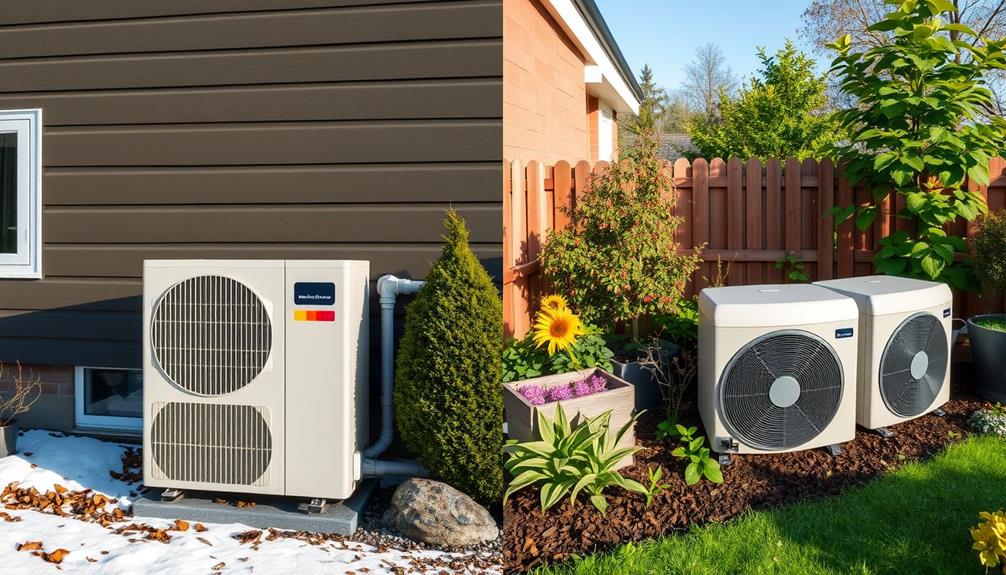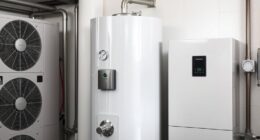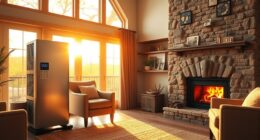Do you find yourself frustrated with a faulty HVAC heat pump? Don’t worry, we can help!
In this article, we’ll share crucial tips for maintaining your heat pump to ensure optimal performance all year round.
From cleaning and changing air filters to inspecting and cleaning the indoor coil, we’ll guide you through the steps necessary to keep your heat pump running smoothly.
Say goodbye to costly repairs and hello to a comfortable home environment.

Let’s dive in!
Key Takeaways
- Regular HVAC heat pump maintenance is important for improved energy efficiency and lower energy consumption.
- Proper maintenance helps in early detection and prevention of potential issues, leading to cleaner and healthier indoor air quality.
- Maintenance of heat pump warranty and prolonged lifespan of the HVAC system can be achieved through regular maintenance.
- Regular maintenance also helps in preventing costly repairs and ensures better air quality and comfort in the living environment.
Benefits of Regular HVAC Heat Pump Maintenance
We strongly believe in the benefits of regular HVAC heat pump maintenance. Regular maintenance not only ensures the optimal functioning of your heat pump but also enhances its efficiency and longevity.
One of the key benefits of regular maintenance is improved energy efficiency. A well-maintained heat pump operates more efficiently, resulting in lower energy consumption and reduced utility bills.
Additionally, regular maintenance helps to identify and address any potential issues before they escalate into major problems, saving you from costly repairs.

Another important benefit is improved indoor air quality. A properly maintained heat pump filters out dust, pollen, and other airborne particles, ensuring cleaner and healthier air for you and your family.
Moreover, regular maintenance helps to maintain the warranty of your heat pump, providing you with peace of mind.
Signs That Your HVAC Heat Pump Needs Maintenance
As HVAC professionals, we understand the importance of proactive maintenance to ensure the optimal performance of your heat pump.
One of the key indicators that your HVAC heat pump needs maintenance is unusual noises during operation. These noises can range from grinding or squealing sounds, which may indicate a worn-out motor or a loose belt.
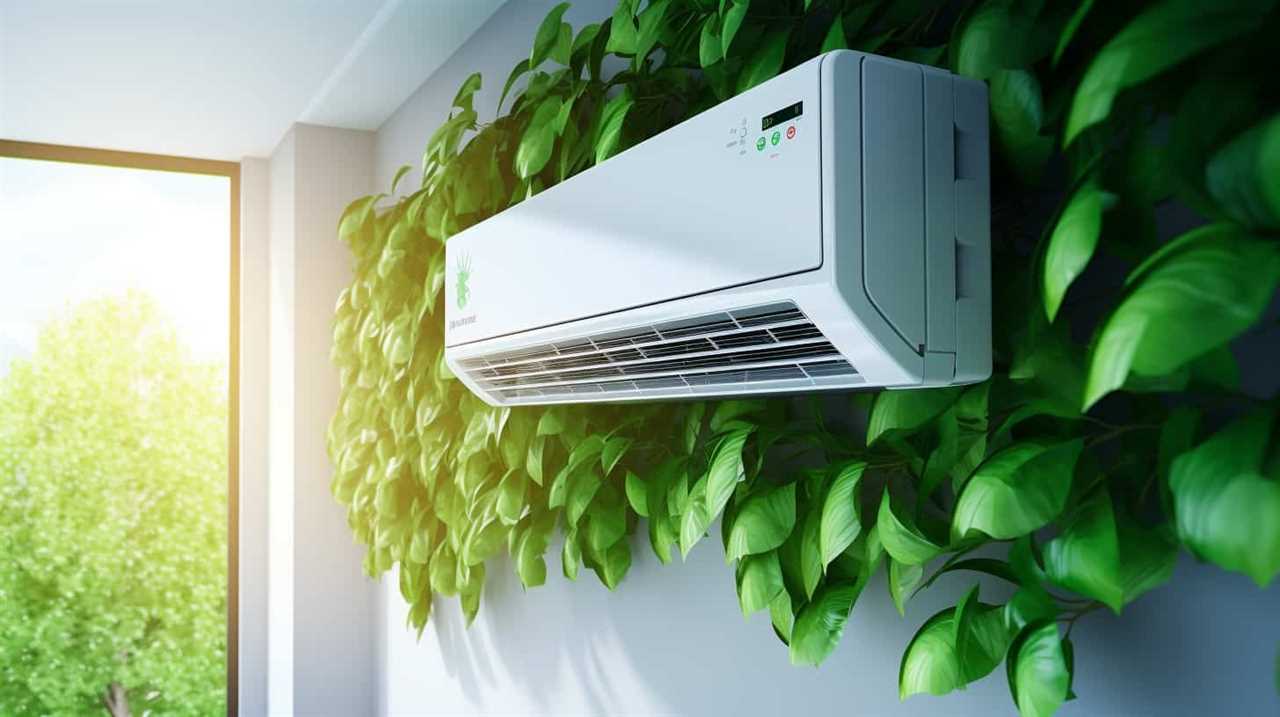
Another sign to look out for is decreased heating efficiency, where you may notice that your heat pump takes longer to reach the desired temperature or struggles to maintain it.
Lastly, frequent temperature fluctuations can be a clear indication that your heat pump requires maintenance, as it may be struggling to maintain a consistent and comfortable indoor environment.
Unusual Noises During Operation
One of the most common signs that our HVAC heat pump needs maintenance is the presence of unusual noises during operation. These noises can indicate various issues within the system that require troubleshooting and maintenance. To help you identify and address these problems, here are some troubleshooting tips and a maintenance checklist to follow:
| Noise | Possible Cause | Recommended Action |
|---|---|---|
| Banging or Clanging | Loose or damaged components | Check and tighten all connections, replace damaged parts |
| Whistling or Hissing | Air leaks in ductwork or valves | Inspect and seal any visible leaks |
| Rattling or Vibrating | Loose or unbalanced fan blades | Tighten or replace fan blades, balance the unit |
Regular maintenance is essential for keeping your HVAC heat pump in optimal condition. By addressing unusual noises promptly and following a comprehensive maintenance checklist, you can ensure the efficiency and longevity of your heat pump system.

Decreased Heating Efficiency
If you notice a decrease in heating efficiency, it may be a sign that your HVAC heat pump needs maintenance. One of the common issues that can lead to decreased heating capacity is a dirty air filter. A clogged air filter restricts airflow, causing your heat pump to work harder and less efficiently. To troubleshoot heating issues, start by checking and replacing the air filter if necessary.
Another potential cause of decreased heating efficiency is a refrigerant leak. Low refrigerant levels can affect the heat pump’s ability to absorb and transfer heat. If you suspect a refrigerant leak, it’s essential to contact a professional HVAC technician for inspection and repair.
Regular maintenance, including cleaning and inspection, can help prevent decreased heating efficiency and ensure optimal performance of your HVAC heat pump.
Frequent Temperature Fluctuations
We should be aware of frequent temperature fluctuations as a sign that our HVAC heat pump needs maintenance. Temperature control is a crucial aspect of an HVAC system, and any inconsistencies in maintaining a consistent temperature can indicate underlying issues.

Frequent maintenance is necessary to ensure optimal performance and prevent any major problems. When the heat pump isn’t working efficiently, it may struggle to regulate the temperature, leading to frequent temperature fluctuations. This can be caused by various factors, such as dirty air filters, refrigerant leaks, or faulty thermostats.
Regular maintenance, including cleaning or replacing air filters, checking refrigerant levels, and inspecting the thermostat, can help identify and resolve these issues, ensuring proper temperature control and optimal performance of the HVAC heat pump.
Importance of Cleaning and Changing Air Filters
When it comes to HVAC heat pump maintenance, one crucial aspect that should never be overlooked is the cleaning and changing of air filters.
Regular filter maintenance is essential to ensure the efficient and optimal performance of your heat pump system. Clean filters not only improve indoor air quality by trapping dust and allergens, but they also enhance energy efficiency by allowing proper airflow and reducing strain on the system.
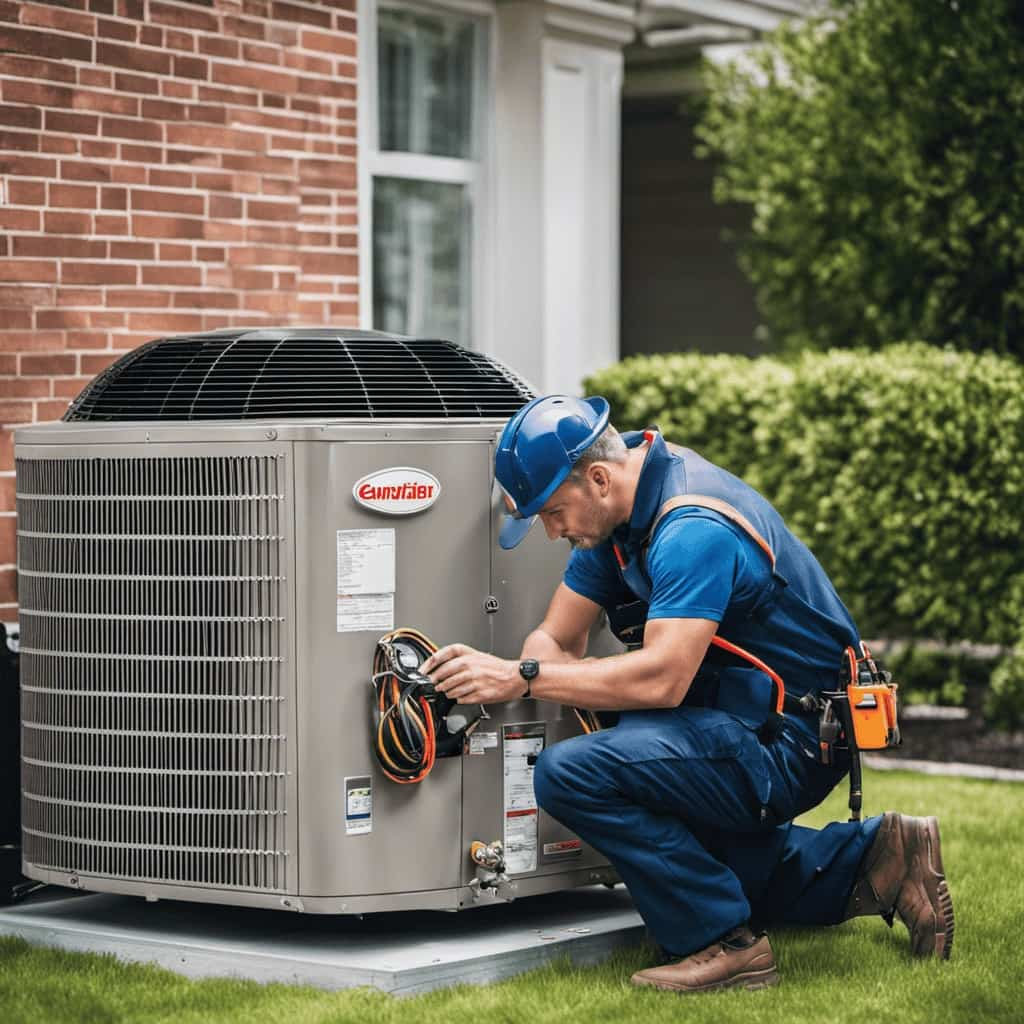
Filter Maintenance Frequency
Regularly cleaning and changing air filters is a key aspect of HVAC heat pump maintenance, and should be done at least once every three months.
Air filters play a crucial role in keeping the air in your home clean and free from dust, dirt, and other particles.
Over time, these filters can become clogged, reducing their efficiency and compromising the performance of your heat pump.
To ensure optimal functioning, it’s important to regularly inspect and clean or replace your air filters.

When cleaning the filters, use a vacuum cleaner or a soft brush to remove any debris.
If the filters are heavily soiled or damaged, it’s recommended to replace them entirely.
Benefits of Clean Filters
Clean filters are essential for maintaining optimal air quality and efficient performance of your HVAC heat pump. Regular cleaning and changing of air filters can greatly improve the air quality in your home or office. Filters trap dust, dirt, allergens, and other pollutants, preventing them from circulating in the air you breathe.
When filters become dirty and clogged, they restrict airflow and decrease the efficiency of your HVAC system. This can lead to higher energy consumption and increased strain on the system. By keeping your filters clean, you can ensure proper airflow, which improves the overall performance of your heat pump.
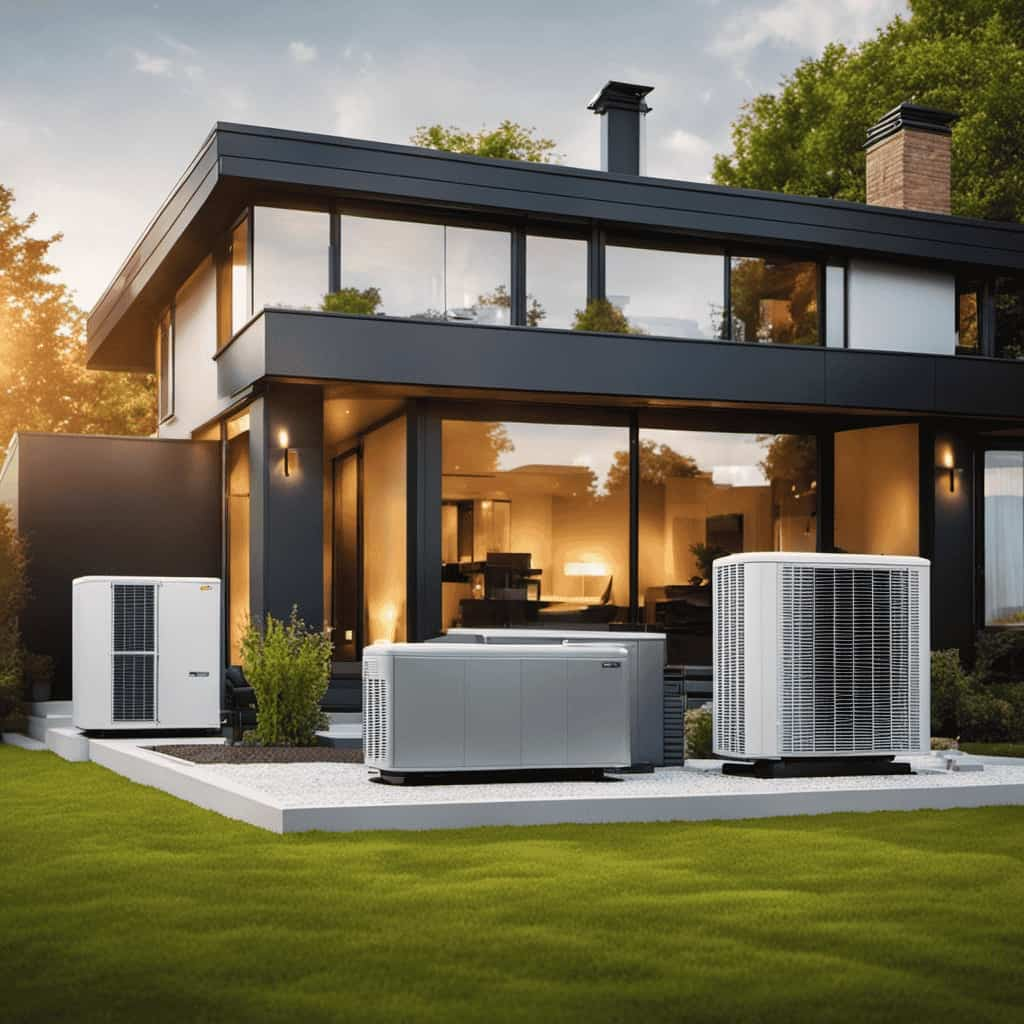
Additionally, clean filters help prevent excessive wear and tear on the system, prolonging its lifespan and reducing the need for costly repairs. So, make it a habit to clean or change your filters regularly to enjoy better air quality and improved performance from your HVAC heat pump.
Impact on Energy Efficiency?
To maximize our energy efficiency, it is important that we regularly clean and change our air filters. Dirty or clogged air filters can restrict airflow and make our HVAC heat pump work harder to maintain the desired temperature. This leads to increased energy consumption and higher utility bills. Moreover, a dirty air filter can also have a negative impact on the environment. When the heat pump has to work harder, it uses more electricity, contributing to higher greenhouse gas emissions. By cleaning or changing our air filters regularly, we can ensure optimal airflow and reduce energy consumption. This not only helps us save money on utility bills but also reduces our environmental impact.
| Benefits of Cleaning and Changing Air Filters | Frequency | Procedure |
|———————————————–|—————|————–|
| Improved energy efficiency | Every 1-3 months | 1. Turn off the HVAC system
2. Locate the air filter
3. Remove the old filter
4. Clean or replace with a new one
5. Reinstall the filter
6. Turn the system back on |
| Reduced environmental impact | Every 1-3 months | 1. Turn off the HVAC system
2. Locate the air filter
3. Remove the old filter
4. Clean or replace with a new one
5. Reinstall the filter
6. Turn the system back on |
Checking and Cleaning the Outdoor Unit
Before starting any maintenance tasks, we should begin by inspecting and clearing any debris from the outdoor unit of our HVAC heat pump. This is an essential step in outdoor unit maintenance as debris can obstruct airflow and reduce the efficiency of the unit.
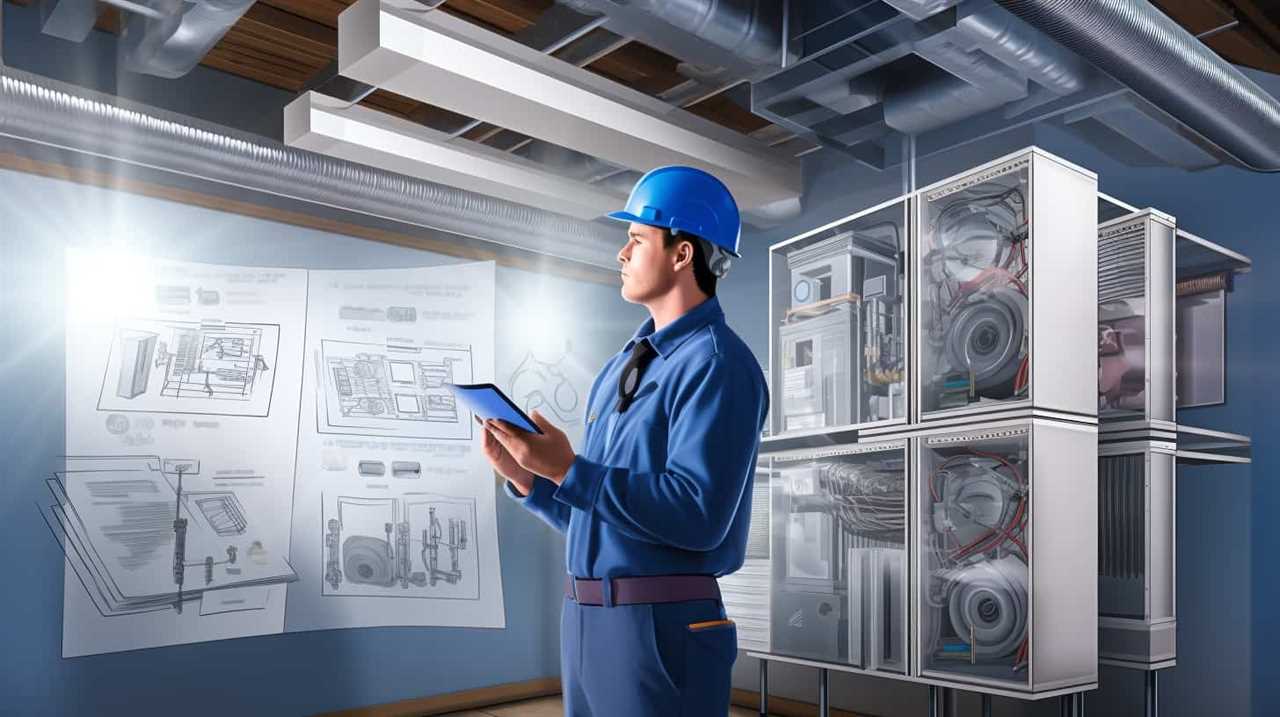
Here are some key points to consider when checking and cleaning the outdoor unit:
-
Visual inspection: Carefully examine the unit for any signs of damage such as bent fins, dents, or cracks.
-
Cleaning the coils: Use a soft brush or a vacuum cleaner with a brush attachment to remove dirt and debris from the coils.
-
Clearing the area: Ensure that the outdoor unit is free from any obstructions such as leaves, grass, or overgrown vegetation.

-
Checking the fan: Inspect the fan blades for any damage or signs of wear, and ensure that it spins freely without any resistance.
Lubricating Moving Parts for Optimal Performance
To ensure optimal performance and reduce wear and tear, we should regularly lubricate the moving parts of our HVAC heat pump. Proper lubrication is essential for the smooth operation of the system and can significantly extend its lifespan. There are several lubrication techniques that can be used to achieve this.
Firstly, it’s important to identify the specific moving parts that require lubrication. These typically include the motor bearings, fan blades, and any other rotating components. Once these parts have been identified, the next step is to select the appropriate lubricant. It’s crucial to use a lubricant that’s specifically designed for HVAC systems, as using the wrong type can cause damage.
When applying the lubricant, it’s important to follow the manufacturer’s instructions. This may involve removing certain parts or using a specific amount of lubricant. Over-lubrication can be just as harmful as under-lubrication, so it’s important to strike the right balance.

Inspecting and Cleaning the Indoor Coil
We should regularly inspect and clean the indoor coil to ensure optimal performance and prevent any potential issues with our HVAC heat pump. The indoor coil plays a crucial role in the heat transfer process, and any dirt or debris accumulation can hinder its efficiency.
Here are some cleaning techniques to add to your maintenance checklist:
- Gently brush off any visible dust or debris from the coil surface.
- Use a soft cloth or brush to clean the coil fins, being careful not to bend or damage them.
- For stubborn dirt or grime, a mild detergent solution can be used to gently scrub the coil.
- Vacuum the area around the coil to remove any loose particles that may have accumulated.
Regularly inspecting and cleaning the indoor coil won’t only improve the heat pump’s performance but also prolong its lifespan.
Now, let’s move on to testing and adjusting thermostat settings for optimal comfort and energy efficiency.

Testing and Adjusting Thermostat Settings
Let’s start by checking the thermostat settings and making any necessary adjustments to ensure optimal comfort and energy efficiency. Testing the accuracy of the thermostat is crucial to ensure that it’s providing the correct temperature reading. You can do this by using a separate thermometer and comparing the readings.
If there’s a discrepancy, it may be necessary to recalibrate the thermostat or replace it if it isn’t functioning properly. Additionally, it’s important to review and adjust the thermostat programming to match your desired comfort levels throughout the day. This includes setting different temperatures for when you’re at home, away, or sleeping.
Removing Debris and Obstructions From Vents and Ducts
How can we effectively remove debris and obstructions from vents and ducts? When it comes to maintaining your HVAC heat pump, ensuring proper airflow is crucial. Here are some important steps to take when removing debris and obstructions from vents and ducts:
- Regularly inspect vents and ducts for any signs of blockages or restrictions.
- Use a flashlight to check for any visible debris or obstructions.
- Clear away any loose debris using a vacuum cleaner with a brush attachment.
- For stubborn blockages, consider using a duct cleaning brush or calling a professional for assistance.
By regularly checking for blockages and airflow restrictions in the heat pump, you can prevent potential issues and ensure optimal performance.

Once you’ve completed these steps, it’s time to move on to scheduling professional maintenance and tune-ups to keep your HVAC heat pump running smoothly.
Scheduling Professional Maintenance and Tune-ups
When should we schedule professional maintenance and tune-ups for our HVAC heat pump? It is recommended to schedule maintenance appointments for your HVAC heat pump at least once a year. Regular maintenance helps ensure that your heat pump operates efficiently and prolongs its lifespan. To find reliable HVAC technicians for your maintenance needs, consider the following factors:
| Factors to consider | Description |
|---|---|
| Certification | Look for technicians who are certified and licensed to work on HVAC systems. This ensures that they have the necessary knowledge and skills to handle your heat pump. |
| Experience | Consider technicians who have extensive experience in servicing and maintaining heat pumps. Their experience indicates their expertise in handling various issues that may arise. |
| Reputation | Read reviews and ask for recommendations from friends or family to find technicians with a good reputation for providing reliable and quality service. |
Frequently Asked Questions
How Often Should I Clean and Change the Air Filters in My HVAC Heat Pump?
We clean and change the air filters in our HVAC heat pump every three months. It is recommended to follow this cleaning frequency to maintain optimal performance and improve air quality in the home.
Can I Clean the Outdoor Unit of My HVAC Heat Pump Myself, or Do I Need to Hire a Professional?
We can clean the outdoor unit of our HVAC heat pump ourselves, but hiring a professional has its benefits. DIY cleaning tips include removing debris and spraying with water, but professionals have the expertise to ensure thorough and proper cleaning.
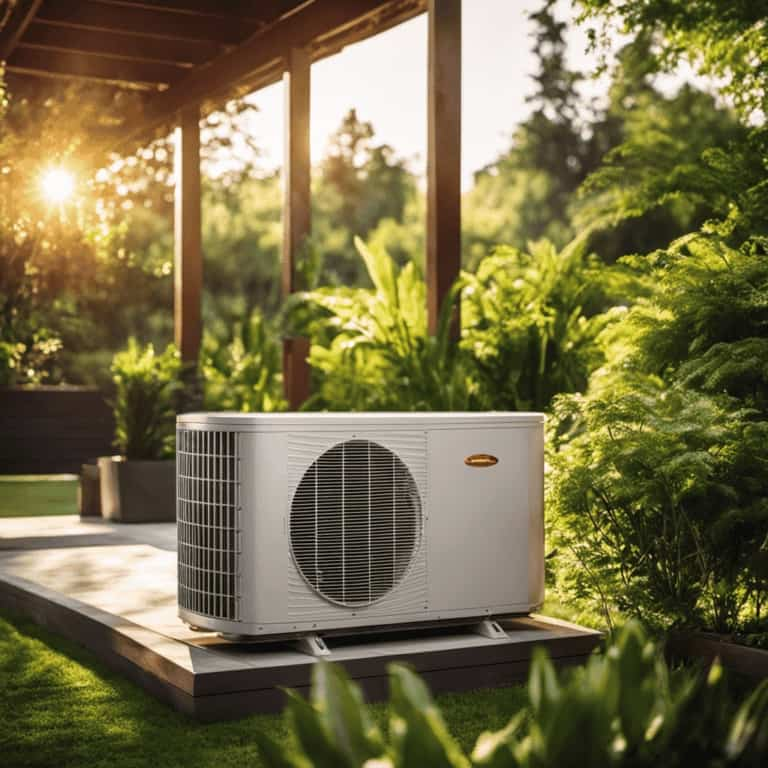
What Are Some Common Signs That Indicate My HVAC Heat Pump Needs Maintenance?
Warning signs of HVAC heat pump maintenance issues include reduced airflow, strange noises, and inconsistent temperatures. Our maintenance checklist includes inspecting and cleaning the outdoor unit, checking refrigerant levels, and testing electrical connections for optimal performance.
How Frequently Should I Lubricate the Moving Parts of My HVAC Heat Pump for Optimal Performance?
We recommend lubricating the moving parts of your HVAC heat pump at least once a year for optimal performance. Regular lubrication helps reduce friction and wear, ensuring smooth operation and extending the lifespan of the components.
Is It Necessary to Schedule Professional Maintenance and Tune-Ups for My HVAC Heat Pump, or Can I Do It Myself?
We recommend scheduling professional maintenance and tune-ups for your HVAC heat pump. It may seem cost-effective to DIY, but professional maintenance ensures optimal performance and prevents costly repairs down the line.
Conclusion
In conclusion, maintaining your HVAC heat pump is crucial for optimal performance and energy efficiency.
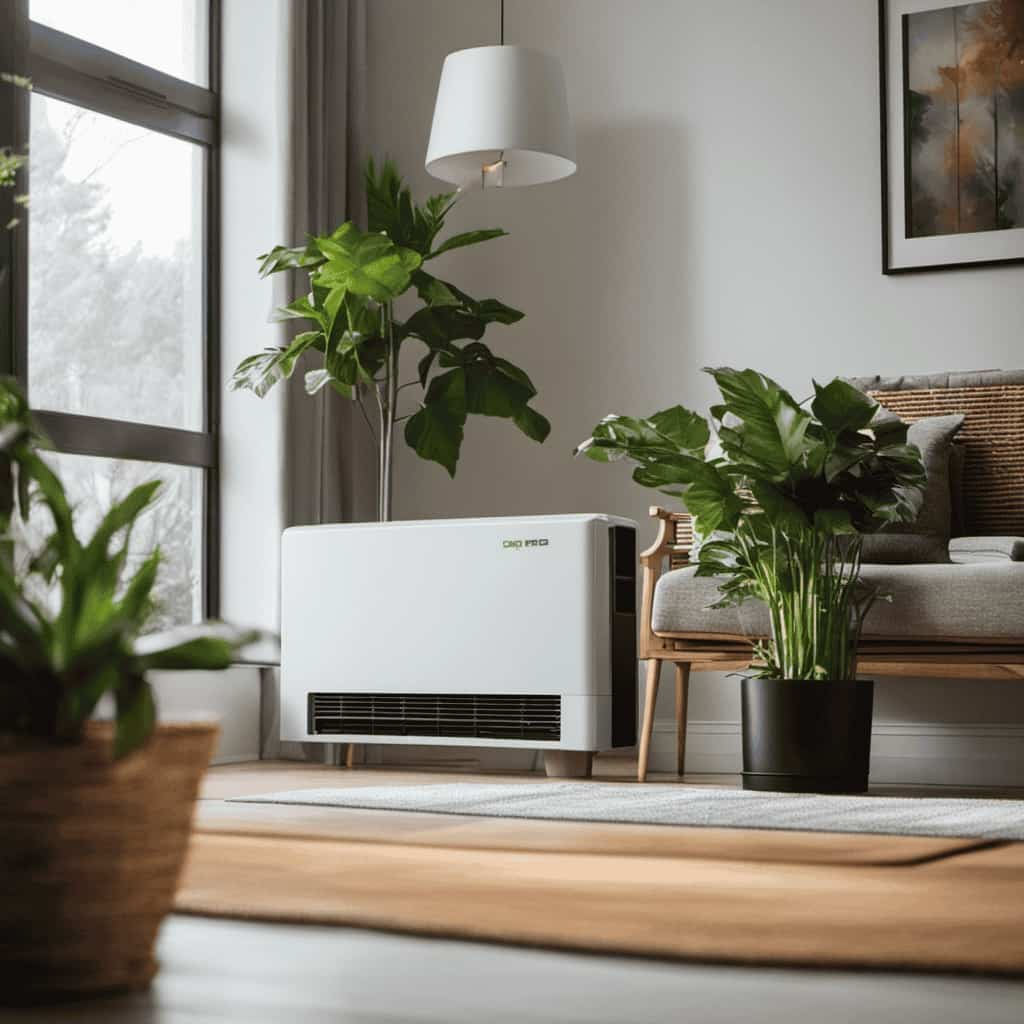
By regularly cleaning and changing air filters, checking and cleaning the outdoor unit, lubricating moving parts, inspecting and cleaning the indoor coil, testing and adjusting thermostat settings, and removing debris from vents and ducts, you can ensure that your heat pump operates smoothly.
Think of your HVAC heat pump as the beating heart of your home, circulating comfort and warmth throughout. Keep it healthy and it will keep you comfortable.





